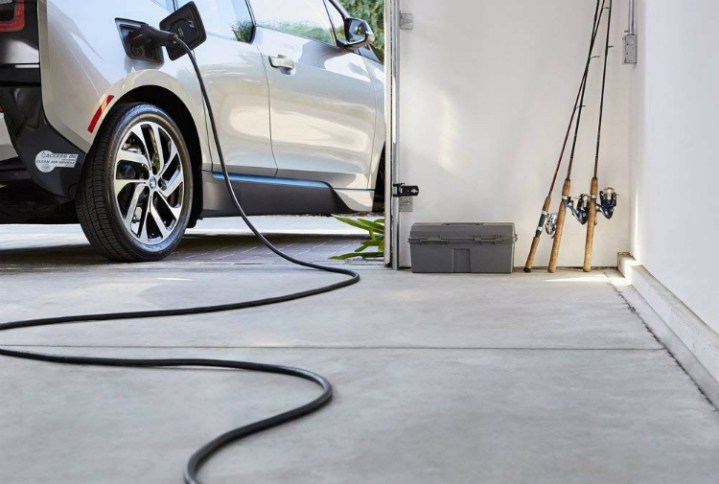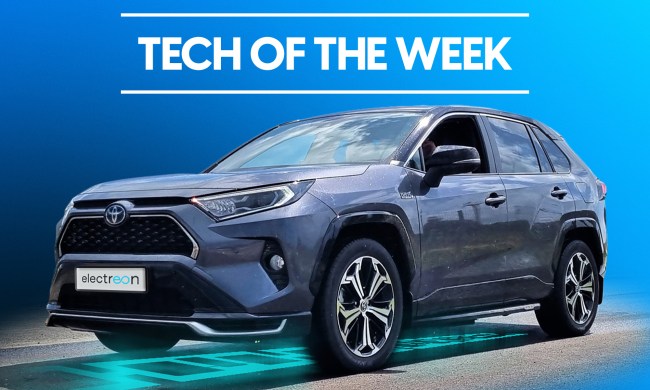One of the biggest perks to owning an electric car is charging it in the comfort of your own home, rather than requiring stops at a gas station every week or so. That means that if you stay on top of charging, and don’t take super long trips, you’ll never really have to worry about when and where to “fill up.”
But there are a number of ways to charge up at home, and they’re not all for everyone. In fact, some options are far better than others — and getting the right charging gear for your needs is definitely worth doing.
There are a few things to consider when buying charging equipment for your home. The first is deciding between a Level 1 charger and a Level 2 charger. You’ll also want to think about charging cable length, and any smart capabilities that allow you to monitor charging remotely.
Here’s everything you need to know about charging your electric car at home.
Use the Level 1 charger that came with your car

You don’t have to spend any time or money on equipment for charging your car if you don’t want to. That’s because all electric cars come with what’s called a Level 1 charger, which plugs into a standard 120-volt outlet in your home.
Level 1 chargers are good for topping off your electric car all the time, but they take a long time to fully charge your battery — typically eight to 10 hours or more, depending on how depleted it is. That makes quick charging stops pretty much impossible.
But, of course, most people don’t need to quickly charge their car when they’re at home. Instead, most will charge up overnight and be ready to go in the morning.
Installing Level 1 chargers is easier too: Just plug it into a standard 120-volt power outlet. Many of them can be mounted to a wall for quick access too — but you don’t have to do that if you don’t want to.
Looking for a new Level 1 charger? Here are some of the best ones out there:
Megear Level 1 Portable EV Charger
The Megear Level 1 Portable EV Charger is a great option for anyone who needs an easy way to charge their electric car at home. It’s small and light, so it can easily be moved around your house or garage and plugged into whatever outlet works best. It also features LED indicator lights that tell you when the charger is connected properly, and it supports a charging speed of up to 1.92kW, which is faster than many of the other portable EV chargers out there.
Lectron Level 1 Portable EV Charger
Another good option is the Lectron Level 1 Portable EV Charger, which is a great choice for anyone who wants something a bit more robust. It supports charging speeds of up to 1.7kW, which isn’t quite as fast as the Megear charger, but it’s still fast enough for most overnight charging. It also has a cable length of 25 feet.
Install a Level 2 charger

If you do want to charge faster at home, then it may be worth investing in a Level 2 charger. Level 2 chargers are more powerful than Level 1 chargers, so they can refill your battery quicker — typically in three to six hours, depending on capacity.
Level 2 chargers require a 240-volt outlet to work properly. You’ll need an electrician to install the outlet for you — and it may even require major wiring upgrades if your home isn’t ready. Not only that, but Level 2 chargers tend to be more expensive than Level 1 chargers. You won’t get a Level 2 charger with your car, so you’ll have to buy one separately, and they typically cost at least $500.
Most people simply don’t need a Level 2 charger for their home, but if you want one, here are some of the best options out there:
Wallbox Pulsar Plus
The Wallbox Pulsar Plus is available in different capacities from 16 to 48 amps, with the largest delivering speeds of up to 11.5kW, which is many times faster than the charging speeds on most Level 1 chargers. It also has a sleek design that makes it look more like a modern piece of technology than an appliance.
Juicebox 40
Another great Level 2 charger is the Juicebox 40, which isn’t quite as fast as the Pulsar Plus, but still fast enough for most. You’ll get speeds of up to 10kW with this one, which should be plenty for most overnight charging needs, and a 25-foot cable. It also has a slim design that allows it to fit into tighter spaces — and an integrated LCD display that shows you your current charging stats.



